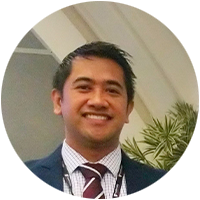Johnievic Valdez | Safety, Quality, Informatics, and Leadership

Recognizing the Need for Improved Safety in Health Care
Although Valdez was coming to his new role in the hospital from a completely different industry, he points out that he wasn’t a stranger to the health care field. Early in his career, he earned a degree in medical technology and worked in laboratory science for a few years. He played an integral part in laboratory quality management and the incident review team. He saw first-hand the frequency with which errors occurred in the health care setting and the unnecessary harm that such errors can cause patients. Yet he had ultimately turned away from health care; before long, he led occupational health and safety efforts with some of the most significant projects in the oil and gas industries in several countries. But his desire to reduce harm to patients remained.
“My personal experience in hospitals has mostly been unpleasant—waiting for several hours in the Emergency Department, learning that a relative passed away after a wrong procedure, finding delayed care and treatment leading to more serious complications, and many other scenarios,” he points out. These situations ultimately caused him to turn his attention back to health care again to try to make an impact.
“I thought that there must be a way to improve health care, to actually provide the highest level of quality and safe care possible. After all, we deal with precious human lives,” he says. “Industries like aviation, oil and gas, petrochemicals, and automotive have evolved significantly over the last few decades to accept no errors or mistakes. We talk about an airplane crash and conduct a big investigation [to find the root cause]. Yet in health care, every hour or so, a patient is dying due to a medical error, and either the system is immediately looking for someone to blame, or else they don’t want to talk about it,” he says.
Building on Harvard Training to Improve Health Care Quality and Safety
To further his efforts to address this problem, Valdez joined SQIL with the London cohort in 2019. He hoped his participation would help him grow his skills to tackle patient safety issues and allow him to gain more strength in his ability to lead in health care overall. The SQIL program met these goals—and more.
Valdez points out that one of the most exciting parts of the SQIL experience was that he has learned from the best experts in the field. “The faculty members didn’t just teach from textbooks. They were the ones who wrote these books and were highly regarded in the field,” he stresses. He also found the knowledge he gained in SQIL could be applied on the job as he went along. This symmetry between the classroom and his work gave him essential confidence in his ability to do his job. It also provided real validation on the job.
“Now, when people [at work] hear my background, they ask if I have any experience in health care. I tell them I attended the SQIL program at Harvard, and this gives me validation and credibility,” he stresses, adding that this has helped him increase his impact on the job. “I lead several teams in my role, and SQIL has given me the confidence to steer them in the right direction,” he says. “When working with senior leaders now, I tell them I learned [the best practices] at Harvard from well-known experts leading the field, and I get instant credibility.”
Building a Network of Experts
Since completing SQIL, Valdez points out that there are also many unexpected benefits he continues to enjoy. For instance, he has access to faculty and experts of Harvard Medical School and a vast network of alumni of the SQIL program.
“Whenever I stumble into any issues, want to compare systems, or simply want to talk about best practices, this vast network is at my fingertips to connect and provide support,” he says. These connections have been invaluable to him.
Valdez has gained so much from SQIL that he now feels committed to “paying it forward.” Therefore, he attends informational sessions with people who are considering enrolling in an upcoming session of SQIL and want to learn more about what they can expect.
“I talk to prospective students about the program and how it helped me bridge industries so effectively,” he says. “I also talk about how my skills translated between roles and how SQIL helped me make the connection.” Regardless of what type of experience each person brings to the table, Valdez says he helps them see how it might relate to what they can learn in the program.
“For instance, I learned that my experience may be in internal audit controls, public health, medicine, or surgery, and yours can be in the laboratory, but within the SQIL group, it’s possible to find where those two areas meet,” he says.
His experience with SQIL was so positive that two of his colleagues in Qatar have since taken the program as well, and a few more are hoping to participate in an upcoming session.
For anyone considering SQIL, Valdez points out that the program is well worth the investment. As he has learned first-hand, it has furthered his career success and has also helped him deepen his commitment to finding a way to make a real difference by improving the safety and quality of health care.
Learn more about Safety, Quality, Informatics, and Leadership.
Written by Lisa D. Ellis